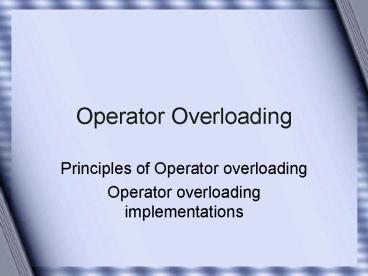Operator Overloading PowerPoint PPT Presentation
1 / 36
Title: Operator Overloading
1
Operator Overloading
- Principles of Operator overloading
- Operator overloading implementations
2
Todays agenda
- Do we need operator overloading?
- Operators unary, binary and ternary
- What operators can be overloaded?
- What operators can not be overloaded?
- Implementation
- Member function
- Non-member friend function
- Non-member non-friend function
3
About operators
- Every operator in C is basically a function
- The prototype is
- return_type operatorX(arguments)
- X is the operator symbol (e.g., ,-,/,ltlt,new)
- MyEq1 MyEq2
- QuadraticEq operator(const QuadraticEq)
Operand1
Operand2
addition operator
4
Do we need operator overloading?
- Assuming two integers a and b, we have been
familiar with - ab
- Rather than
- a.add(b) or add(a,b)
- What about objects of user-defined classes?
- E.g., two QuadraticEq objects x,y
- Can we write xy then?
5
Recall our class QuadraticEq
- We will try to add two QuadraticEq objects x and y
6
Class declaration
7
(No Transcript)
8
What happens?
9
Operator addition does not work!
- We will try to work this out!
- We overload addition operator for class
QuadraticEq
10
Unary, binary and ternary Operators
- Unary operator operator with one operand
- , (dereference), , --
- E.g. x, y, x, z
- Binary operator operator with two operands
- , (multiplication), /,
- E.g. ab, cd, x/y
- Ternary operator operator with three operands
- ? (the only ternary operator)
- Condition? if true if false
- (xgt0) ? x 0
11
Fundamentals
- Operator overloading means create a function of
existing operators for user-defined class - Function name convention
- Keyword operator followed by the symbol
- E.g., operator addition? the symbol
- Function name operator
12
Fundamentals
- Function prototype
- Return_type operator( arguments )
- The number of arguments depends on
- whether we implement as member function or
non-member (friend) function - Whether it is unary, binary or ternary operator
- To be discussed later
13
Fundamentals
- Operators must be overloaded explicitly
- Overloading does not overload
- Using operators on a class object
- It must be overloaded for that class
- Exceptions
- Assignment operator,
- Memberwise assignment between objects
- Address operator,
- Returns address of object
- Both can be overloaded
- Overloading provides concise notation
- object2 object1.add(object2)
- object2 object2 object1
14
Restrictions
- Can not create new operator
- E.g., we can not create operator or operator
- Cannot change
- How operators act on built-in data types
- I.e., cannot change integer addition
- Precedence of operator (order of evaluation)
- Use parentheses to force order-of-operations
- Associativity (left-to-right or right-to-left)
- Number of operands
- is unitary, only acts on one operand
15
Example
- Class Fraction
- Representing fractional number
- E.g. 3/5, 4/7, etc
- Overload addition operator
16
Class Fraction
17
- Compilation ?Unsuccessful
- Operator is not yet defined for class Fraction
18
How do we overload operator
- Possibilities
- Fraction Fraction
- Fraction Integer
- Integer Fraction
- Operator must be overloaded for every
possibility - Consider FractionInteger case
- Implement as member function
- Prototype
- Fraction operator ( const int )
19
(No Transcript)
20
(No Transcript)
21
Implementation
- We can implement operator overloading as
- Member function
- Non-member friend function
- Non-member non-friend function (just like
function in general)
22
Invoking overloaded operator
- Adding two class objects ab
- Member function implementation
- a.operator(b)
- Non-member function implementation
- operator(a,b)
- Both have EXACTLY the same effect
23
Implement unary operator
- Operator with one operand, the object itself
- Member function without argument
- Return_type operatorX()
- Non-member function with one argument
- Return_type operatorX( ClassName )
-
as data type
24
Overload operator!
25
Execution Output
26
Implement Binary operator
- Operator with two arguments
- Possibilities
- Class object class object
- Member or non-member
- Class object other object
- Member or non-member
- Other object class object
- Member or non-member
27
Class object class object
- Member function prototype
- Return_type operatorX( Classname )
- Non-member friend function prototype
- friend Return_type operatorX( Classname,
Classname)
28
(No Transcript)
29
(No Transcript)
30
(No Transcript)
31
(No Transcript)
32
Class object other object
- Member function prototype
- Return_type operatorX( Othertype )
- Non-member friend function prototype
- friend Return_type operatorX( Classname,
Othertype)
33
Other object class object
- Non-member friend function
- friend Return_type operatorX( Classname,
Classname) - Can not be member function
- YHW?
34
Class Quadratic Equation
- Consider overloading addition operator for two QE
objects - Prototype as member function
- QuadraticEq operator( const QuadraticEq )
- Prototype as non-member friend function
- Friend QuadraticEq operator( const
QuadraticEq, const QuadraticEq )
Will you try it out??
35
Class Quadratic Equation
- Consider overloading ltlt operator
- X is the operator symbol (e.g., ,-,/,ltlt,new)
- cout ltlt MyEq
- ostream operatorltlt(ostream, const QuadraticEq
)
Operand1
Operand2
Stream insertion operator
Will you try it out??
36
SuMMaRY
- Operator overloading is allowed to make
operations with user-defined classes concise and
clear - Operator overloading can be implemented as class
member function or non-member function - Both choices do not have effect on the operation

